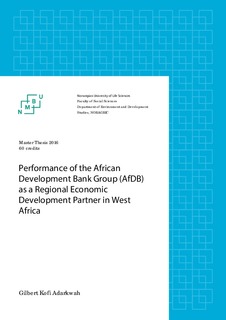Performance of the African Development Bank Group (AfDB) as a regional economic development partner in West Africa
Master thesis
Permanent lenke
http://hdl.handle.net/11250/2398220Utgivelsesdato
2016-08-08Metadata
Vis full innførselSamlinger
Sammendrag
This thesis examines the performance of the African Development Bank Group (AfDB) as advisor to African governments on Economic policy and planning. The thesis focuses on countries within the Economic community of West African States (ECOWAS). Ghana, a member of the ECOWAS countries, is singled out as a case study for the analysis. To perform the analysis, the thesis examines the purpose for the establishment of the AfDB, its mission as well as sources of funding and projects. The AfDB relationship with other multilateral development institutions, specifically the World Bank Group is assessed, in terms of the levels of capitalization and lending windows. To effectively guide what to measure, the Universalia model of organizational Assessment, developed by Professors Charles Lusthaus and Gary Anderson of the Department of Administration and Policy Studies at McGill University, is adopted for this study. Four factors were assessed: effectiveness, efficiency, relevance and financial viability of the AfDB.
This thesis concludes that the AfDB is an institution in the process of (re) defining its focus and seeking to establish itself among its member states. The AfDB has been in the shadows of the World Bank Group, the IMF and other multilateral institutions. Overall the AfDB has so far played a limited role in national policy dialogue with low visibility and minor contributions within the West African region. Moreover, in Ghana the AfDB has been criticised for being over-responsive to incumbent governments to the extent that it sometimes becomes inconsistent with the need for a firmer, more fundamental and coordinated stand in policy dialogue.

